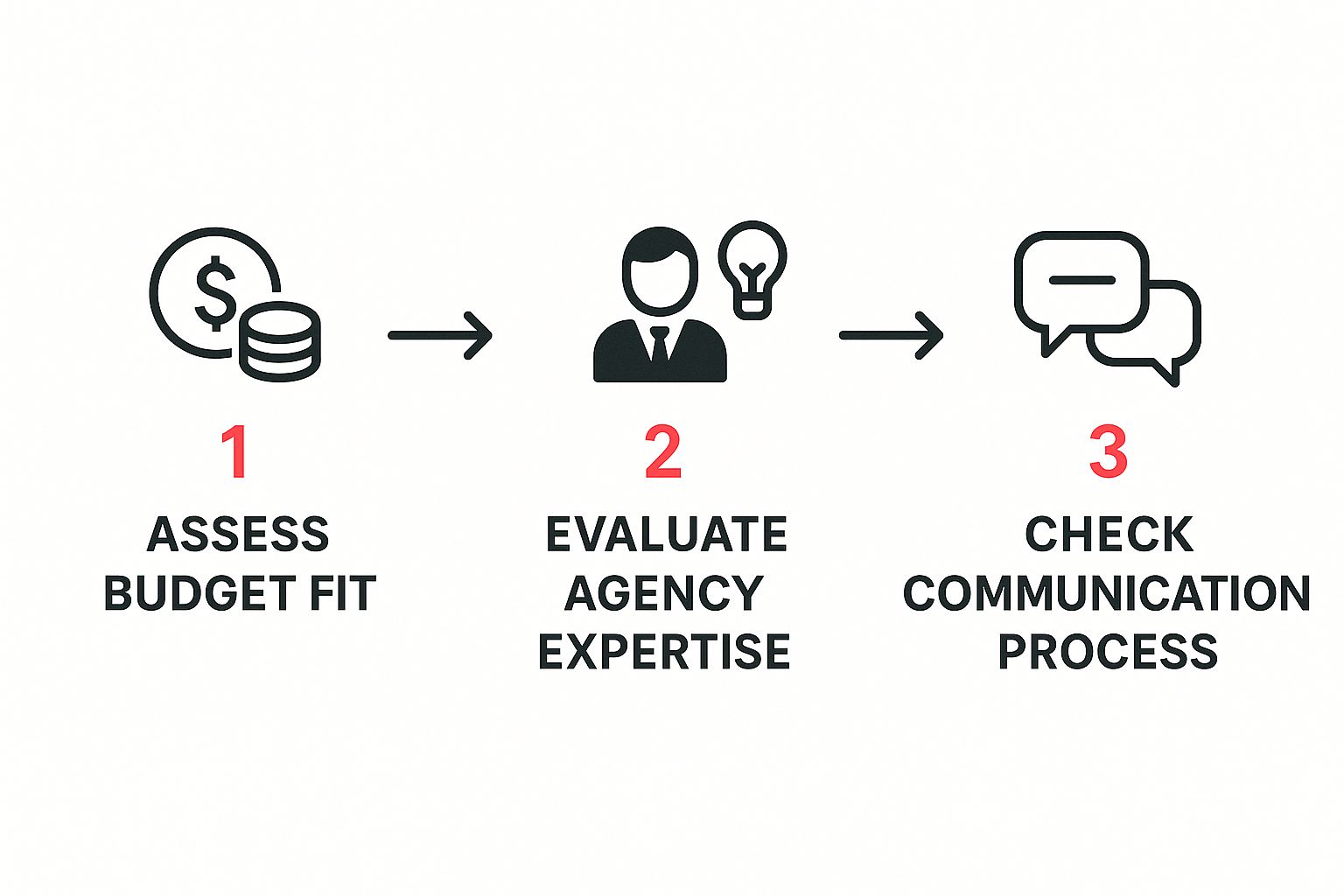Choosing a Marketing Agency for Startups
Choosing a marketing agency for startups doesn't start with a Google search. It starts with a brutally honest look in the mirror. Success hinges on knowing exactly what your business needs to grow and that means getting way more specific than just wanting 'more traffic'.
It's all about defining clear, measurable goals that will act as a filter, attracting the right specialists and saving you from endless, unproductive calls.
Defining What Your Startup Actually Needs

Before you even think about finding an agency, you need to create a detailed brief. A sharp, well-defined brief is your secret weapon. It attracts agencies with the right skills and weeds out the generalists peddling one-size-fits-all solutions. Getting this right from the beginning sets the stage for a partnership that actually works.
First things first, conduct a quick audit of your marketing so far, even if it feels minimal. What have you tried? What worked? What was a total flop? This isn’t about judging past efforts; it's about spotting your biggest growth gaps right now.
From Vague Goals to Specific Objectives
"We need more leads" just won't cut it. You have to translate those broad ambitions into specific, measurable, achievable, relevant and time-bound (SMART) goals. This simple exercise turns a fuzzy wish list into a strategic document that agencies can actually work with.
Think about the difference:
-
Instead of: "We need more website traffic."
-
Try: "We need to increase organic traffic from UK-based software developers by 40% in the next six months."
-
Instead of: "We want better leads."
-
Try: "Our goal is to generate 50 marketing-qualified leads (MQLs) per month with a customer acquisition cost (CAC) below £500."
This level of detail means any potential agency understands your exact definition of success from day one. It’s also worth getting your head around the different models of support out there. For instance, you might want to weigh up the pros and cons of Fractional CMOs vs. Marketing Agencies to see what fits your stage of growth.
Tailoring Needs to Your Business Model
The right marketing strategy for a B2B SaaS company looks completely different from one for a D2C brand. A generic approach is a recipe for wasted budget. If you want to go deeper on this, our comprehensive marketing explained guide for startups is a great place to start.
A B2B SaaS startup chasing enterprise clients, for example, will likely need to focus on account-based marketing (ABM) and creating a library of in-depth white papers. They’re playing the long game, nurturing high-value relationships over months.
On the other hand, a new direct-to-consumer (D2C) ecommerce brand needs an agency that lives and breathes performance marketing. Their world is all about highly targeted social media ad campaigns that drive immediate sales and build brand buzz fast.
Your goal is to articulate not just what you want to achieve but why it matters to your business right now. A detailed brief becomes the foundation of your search, ensuring every conversation you have is productive and focused on tangible outcomes.
How To Find And Shortlist The Right Agencies

With a sharp brief in hand, you can finally move past generic searches and start hunting for agencies with genuine startup DNA. The goal here isn't just to find an agency but to build a longlist of potential partners who truly understand the unique pressures and opportunities of an early-stage business.
This means looking in the places where proven startup marketers actually gather, not just who pops up first on Google.
The UK's startup scene is absolutely booming. In recent years, the number of new ventures has surged, with a staggering 89,515 launched in Q1 2025 alone—that's a 2.8% jump from the previous year. This rapid growth has created a huge demand for specialist agencies that can deliver sharp go-to-market strategies and drive rapid scaling.
Uncovering Specialist Agencies
Your search needs to go a lot deeper than a simple query. The best partners often aren't the ones with the biggest ad spend but the ones with the most relevant results and the right kind of experience under their belts.
A great place to start is by exploring the portfolios of venture capital (VC) firms that invest in startups similar to yours. See who they've worked with. See who their portfolio companies have worked with. This is a massive signal of an agency's ability to handle the demands of a venture-backed business.
LinkedIn is another goldmine. Look for seasoned marketers who have previously worked at successful startups and have since moved to an agency. Their experience is invaluable because they get the lean, fast-paced environment and the relentless need to demonstrate ROI. Fast.
Building Your Longlist
Aim to pull together a list of 10-15 agencies before you even think about shortlisting. This gives you enough options to compare properly without getting completely overwhelmed.
As you find potential candidates, look for these specific signals:
- Relevant Case Studies: Do they have clear, data-backed success stories from startups at a similar funding stage and in a similar sector? Vague promises won't cut it.
- Startup-Centric Language: Read their website. Does it speak to the real challenges of scaling, finding product-market fit and managing burn rate? Or is it just filled with corporate jargon?
- Founder or Team Background: Dig into the agency's leadership. Do they have direct experience working in or founding startups themselves?
A great marketing agency for startups doesn't just offer services; they offer a perspective shaped by direct experience. They understand that for a startup, every pound spent on marketing must be an investment in measurable growth, not just a line item on an expense report.
Narrowing Down To A Shortlist
Once you have your longlist, it’s time to cut it down to the 5-7 most promising candidates. This is where you really need to scrutinise their online presence and client testimonials for signs of a good cultural fit. Do their values seem to align with yours? Do their clients praise their communication and collaborative spirit or just the end result?
This initial research is crucial. It ensures you only invest your time in discovery calls with agencies that genuinely understand the startup world.
For a broader view, you can also consult curated lists to discover some of the top digital marketing agencies in the UK that might fit your criteria.
Evaluating Proposals and Vetting Potential Partners
So, the proposals have started to hit your inbox. Now the real work begins. This is where you cut through the polished pitch decks and separate the genuine strategists from the slick sales teams to find out what each agency can actually deliver for your startup.
A flashy presentation is one thing but it means nothing without a solid, data-informed plan behind it. Your job is to properly vet each potential partner to make sure their approach clicks with the specific, measurable goals you’ve already set.
Digging Deeper Than The Pitch Deck
Think of your discovery calls as an interrogation of their strategic thinking, not a passive presentation. Don't just let them list their services; you need to challenge them to explain exactly how those services will directly move the needle on your key performance indicators (KPIs).
Get some insightful questions ready that really probe their process:
- Strategic Rationale: "Based on our brief, what's the single biggest opportunity you see for our growth and what's the very first thing you'd do to jump on it?"
- Data and Measurement: "How will you measure success for this campaign beyond vanity metrics? What specific KPIs will you report on weekly and monthly?"
- Startup Experience: "Talk me through a time you worked with a startup at our stage and hit a major wall. How did you pivot your strategy?"
Questions like these force them to drop the generic sales talk and show they genuinely understand the unique pressures a startup is under.
Critically Analysing Case Studies
Case studies are an agency’s highlight reel but you need to look behind the curtain. Don’t get distracted by big brand logos. Instead, ask for specific, hard data from clients who were in a similar boat to you when they started.
A great marketing agency for startups won't just show you impressive final results. They will be transparent about the entire journey, including the initial customer acquisition cost (CAC), the payback period and the ultimate return on investment (ROI).
Ask for details like, "What was the client's CAC before you started and what was it after six months?" This is the kind of detail that separates agencies that track meaningful business metrics from those that just focus on top-of-funnel noise. It's crucial to get your head around these figures and you can learn more about mastering marketing performance metrics to get ready for these conversations.
This infographic breaks down a simple way to structure your evaluation process.

As it shows, your evaluation has to balance the hard numbers of budget with the softer—but just as critical—elements like expertise and communication.
A Framework For Objective Comparison
Gut feeling has its place but a decision this important needs to be backed by data. It's a good idea to create a simple scoring matrix to compare each agency objectively against the criteria that matter most to your startup. This helps take personal bias out of the equation and keeps the focus on tangible factors.
Here’s a practical table to help you score each agency against what your startup actually needs. It’s a simple way to turn a subjective choice into a data-driven decision.
Agency Proposal Evaluation Checklist
| Evaluation Criteria | Agency A Score (1-5) | Agency B Score (1-5) | Notes & Red Flags |
|---|---|---|---|
| Startup Experience & Fit | 4 | 3 | Agency B's case studies are mostly larger, corporate clients. |
| Strategic Rationale | 5 | 4 | Agency A provided a clear, actionable 90-day plan. |
| Clarity of Deliverables | 5 | 3 | Agency B's proposal was vague on specific outcomes. |
| Data & ROI Focus | 4 | 2 | Agency B focused on traffic, not revenue metrics like CAC . |
| Communication & Culture | 5 | 4 | Felt a stronger connection with the team at Agency A. |
| Price & Value | 3 | 5 | Agency A is pricier but the value appears higher. |
Using a simple scorecard like this gives you a much clearer, side-by-side view, making it easier to see who truly understands your vision and who is just going through the motions.
Matching Agency Specialisms to Your Growth Stage

The term ‘startup agency’ is a bit of a misnomer. It paints a picture of a single partner that can do it all but the reality is much more specific. An agency’s real value comes from its specialism and if that doesn’t line up perfectly with where your business is right now , you’ll burn through your budget with very little to show for it.
What you need today is completely different from what you'll need in eighteen months. Are you a pre-seed company still trying to nail product-market fit? Or are you a Series A business ready to pour fuel on the fire for aggressive user acquisition? The marketing required for each is worlds apart.
Think about it this way: an agency that’s famous for making D2C brands go viral on TikTok is almost certainly the wrong choice for an enterprise B2B SaaS company. Your B2B startup needs a partner who understands the slower, more deliberate game of technical SEO, long-form content and account-based marketing to nurture six-figure deals over several months.
Aligning Specialisms with Startup Needs
Getting this right is critical. In fact, a mismatch between a startup's needs and an agency's core skills is one of the most common reasons these partnerships fall apart. Before you even start looking, you need to pinpoint your single biggest growth bottleneck. Then, find a specialist who lives and breathes that exact problem.
-
For Early-Stage (Seed) Startups: Your main goal is validation. You need to find your first customers and prove your concept. An agency laser-focused on performance marketing can help you test channels and messages quickly to see what sticks.
-
For Growth-Stage (Series A/B) Startups: You’ve found your groove and now it's all about scale. This is where an agency with deep expertise in technical SEO and content strategy becomes a game-changer, building a long-term, organic growth engine that compounds over time.
-
For Niche or Regulated Industries: If you operate in a complex space like fintech or health-tech, you can’t afford a generalist. You need a partner who gets the nuances of compliance and trust-building. Look for specialists in brand building and digital PR within your specific sector.
Choosing an agency isn't just about finding good marketers; it's about finding specialists who have already solved your exact growth problem for a company just like yours, multiple times over.
The Role of an Agency's Tech Stack
Beyond their marketing expertise, the technology an agency uses says a lot about how efficient and forward-thinking they are. The best partners use a sophisticated tech stack to automate routine work, dig up deeper insights and ultimately stretch your budget further.
This is completely changing how modern agencies work. For instance, digital marketing agencies in the UK are leaning heavily into artificial intelligence to support startups. A huge 94% of digital marketers are already using AI in their advertising strategies. This isn't just about efficiency; it's reshaping jobs, allowing 75% of marketing staff to step away from mundane tasks and focus on high-level strategy. You can read more about how AI is shaping UK marketing agencies at SearchHog.co.uk.
When you’re talking to potential agencies, don’t be afraid to ask direct questions about the tools they use. What analytics platforms do they rely on? Which marketing automation software is their go-to? Their answers will tell you whether they’re truly equipped to give you a competitive edge.
Setting Up Your New Agency Partnership for Success
Choosing your marketing agency is a huge milestone but let's be clear: the real work starts after you’ve signed on the dotted line. A truly successful partnership is built on a strong, deliberate foundation from day one. Skipping this part is like trying to build a house without blueprints; it might look okay for a week or two but you’re setting yourself up for a messy collapse.
Your first port of call should be that final contract. Go beyond the top-line numbers and really get into the weeds of the details that will govern your relationship. Pay very close attention to termination clauses . You need a fair and clear exit path if things don't work out. Just as important is clarifying intellectual property ownership —make absolutely sure you own all the creative assets and campaign data they produce for you.
Establishing Your Onboarding Framework
With the contract sorted, a comprehensive onboarding plan isn't just a nice-to-have; it's non-negotiable. This is where you set mutual expectations and build the collaborative rhythm you need for actual growth. The goal is to shift from a client-vendor dynamic to a truly integrated partnership, and fast.
Your immediate onboarding checklist should look something like this:
- Communication Channels: Get a shared Slack or Teams channel set up right away. This simple step breaks down the formal barriers of email and encourages the quick, informal communication that startups thrive on.
- Clear Points of Contact: Define a single, go-to person on both sides. This simple move prevents confusion and makes it crystal clear who is accountable for what from the get-go.
- Deep Data Access: Don't hold back. Give them the keys to your Google Analytics, CRM and any other relevant data platforms. An agency flying blind is an agency destined to fail.
Getting this right is especially vital in today's market. The UK digital marketing industry is projected to hit revenues of £20.4 billion by 2025, within a wider agency market expected to reach £61.2 billion by 2027. In such a competitive space, a slick onboarding process helps a good agency deliver value much faster. You can find more of these fascinating UK digital agency statistics on CapsuleCRM.com.
Co-Creating Your First 90-Day Plan
The final piece of the puzzle is working together to create an actionable 90-day plan. This shouldn't be a document the agency simply hands over to you; it has to be a collaborative effort. This process ensures their strategic thinking lines up perfectly with your internal business goals and, crucially, your available resources.
The first 90 days aren't just about chasing quick wins. They're about building trust, establishing a workflow and proving that this new partnership can turn strategic talk into measurable results. This initial plan becomes the bedrock of everything that follows.
This plan needs to outline specific, measurable goals for the first quarter. It should also detail the key activities needed to hit them and define what the reporting cadence will look like. By building this together, you create a sense of shared ownership over the outcomes and set your new partnership on a clear path from day one.
Got a Few Lingering Questions?
Even with a solid plan, it's completely normal to have a few last-minute questions before you sign on the dotted line. Choosing a marketing partner is a huge decision, one that involves a serious investment of both cash and trust.
Most of the time, these final hesitations boil down to the same three things: cost, contracts and timing. Let’s clear those up so you can move forward with confidence.
How Much Should a Startup Expect to Pay for a Marketing Agency?
This is always the first question and the honest answer is: it depends. Agency fees are a reflection of their reputation, the services you need and the level of expertise involved.
That said, for a UK startup that’s ready to grow, a typical monthly retainer with a quality agency will land somewhere between £3,000 and £10,000 .
This budget usually gets you a dedicated core team and specific services like SEO, content marketing or paid ad management. Bigger, one-off jobs like a full website redesign will be quoted separately. A word of advice: the cheapest quote is rarely the best value. You're not just buying a list of tasks; you're investing in strategic thinking and execution that will actually grow your business.
What’s a Realistic Contract Length?
Most agencies worth their salt will ask for an initial commitment of at least six months . I know, that can feel like a long time when you're a startup but there's a very good reason for it.
Real marketing results, especially from organic channels like SEO and content, don't just appear overnight. It takes time to build genuine momentum.
This initial period gives your new partner enough runway to:
- Dig deep into research and analysis.
- Build and roll out a proper strategy.
- Gather enough data to start optimising what works.
- Actually show you a tangible return on your investment.
Be very cautious of any agency promising the world in 30 or 60 days. A six-month agreement is a sign that they're focused on building sustainable growth, not just chasing vanity metrics for a quick win. After that initial term, things often shift to a more flexible rolling monthly or quarterly contract.
When Is the Right Time to Bring an Agency Onboard?
Knowing when to hire an agency is just as critical as knowing who to hire. The sweet spot is usually when you’ve found some product-market fit and have early traction but you’re hitting a wall trying to scale marketing on your own.
You’ve probably reached the point where founder-led marketing just isn't cutting it anymore if you want to hit those ambitious growth targets. Telltale signs include feeling swamped by marketing tasks, knowing you lack the specialist skills for certain channels or seeing your growth start to flatline.
Hiring an agency at this stage injects your business with expert strategy and execution right when you need it most. It frees you up to get back to focusing on your product, your team and your operations.
Ready to find a partner who gets the unique grind and opportunity of a growing startup? At Superhub , we build data-driven marketing strategies that deliver real results. We specialise in helping businesses in the motorsport, tourism and automotive sectors achieve explosive growth.
Want This Done For You?
SuperHub helps UK brands with video, content, SEO and social media that actually drives revenue. No vanity metrics. No bullshit.



